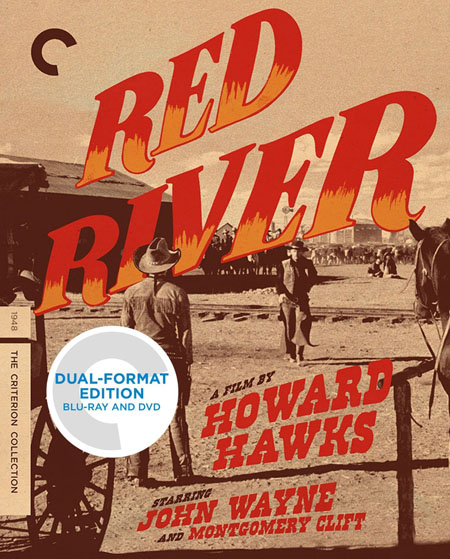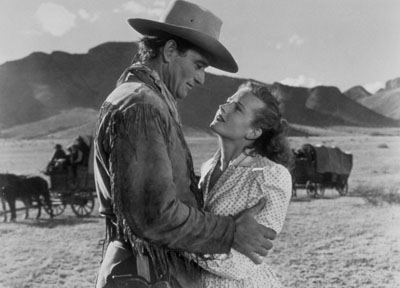
RETRO-ACTIVE: THE BEST OF THE CINEMA RETRO ARCHIVES
"THE SON-OF- A -BITCH
CAN ACT!"
By Raymond Benson
It’s
well-known that when John Ford, who had worked with actor John Wayne on a
number of films prior to seeing him in Howard Hawks’ Red River, proclaimed that he didn’t know that “the son-of- a-
bitch could act!â€
His
words were apt. Prior to the release of Red
River in 1948 (it was shot in 1946 but didn’t appear in theaters until
’48), Wayne had mostly played the likable, stalwart “John Wayne†character that
had first appeared in Ford’s Stagecoach (1939).
But in Red River, Wayne plays a role
that turned critical and public opinion of the actor’s thespian abilities. He
pulls off a remarkable feat—Wayne’s character, Thomas Dunson, is a first-class
S.O.B., a guy you really want someone to punch out throughout the movie; and
yet, Wayne manages to make him likable. He carries an audience through over two
hours of hardcore western, and he delivers one of his two or three best
performances. It doesn’t hurt that Wayne is ably supported by Montgomery Clift,
who plays Wayne’s adopted son. In many ways, it’s really Clift’s picture—he’s
the protagonist, and the story is seen through his eyes. But wait—maybe it’s
seen through Walter Brennan’s eyes in the original, rare theatrical cut,
released here in a glorious 2K digital restoration on Blu-ray.
In
fact, I had never seen the theatrical cut, the version preferred by director
Hawks. A longer cut, by about six minutes, was the one that was shown on
television and appeared on previous home video releases. The longer version was
actually intended as a preview for studio execs; it utilizes on-screen textual
transitions (as if the audience is reading from a book) and an extended final
confrontation between Wayne and Clift. The theatrical cut dispenses with the
textual transitions and instead substitutes sequences narrated by Walter
Brennan, who then, arguably, becomes the character through whose eyes we see
the story. Why this version, which originally played to audiences in 1948,
didn’t become the standard edition after that is a mystery; in actuality, Hawks
was quite right—the theatrical cut is the
better one, except for the trimmed final fight between the two leads. As Hawks tells Peter Bogdanovich in an audio
interview included as an extra in the Criterion Collection’s elaborate box set,
the best way to watch Red River is to
view the theatrical cut up until the last few minutes, and then change to the
preview cut at the point when Wayne marches through the heads of cattle to
confront Clift at the corral.
Another
thing that is remarkable about Red River is
that it was Hawks’ first western. He would go on to make a handful more (good
ones, too!), and was known for making pictures in all genres, but the fact that
he went out of the gate with one of the greatest westerns of all time is truly
an achievement. Red River, without
question, is one of the five best
American films of the genre.

The
story is a fictional account of the first cattle drive from Texas to Kansas
along the Chisholm Trail, the hardships the men overcome, and the battle of
wills between Wayne, the tyrannical leader and father, and Clift, the calmer,
perhaps smarter right-hand cowpoke and adopted son. Hawks manages to capture the
perilous trek with uncanny realism, assured composition and tempo, and drama.
Hawks once said that the key to a good film was “three good scenes and no bad
ones.†Well, Red River has far more
than three good scenes. The stampede sequence is nothing short of astounding.
Criterion
went all out on this one. It’s a four-disk set—two Blu-rays and two DVDs
containing identical material. Both versions of the film are included, along
with a couple of interviews with Bogdanovich, who explains the difference
between the two cuts and presents his views on the picture. Critic Molly
Haskell talks about Hawks in a new video interview, and film scholar Lee Clark
Mitchell tells us all about the western genre in an interesting piece. There
are audio excerpts from interviews with Hawks and novelist Borden Chase, as
well as a Lux Radio Theatre adaptation of Red
River featuring Wayne, Joanne Dru, and Brennan. Besides the usual
essay-filled booklet, the box comes with Chase’s original novel, Blazing Guns on the Chisholm Trail, from
which the film was adapted.
Great
stuff, and worth every penny.
CLICK HERE TO ORDER FROM AMAZON